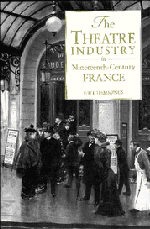Book contents
- Frontmatter
- Contents
- Chronology
- Introduction
- PART I THE AUDIENCES
- PART II THE ACTING PROFESSION
- 9 A pariah profession
- 10 Social origins
- 11 Training for the stage
- 12 Salaries and contracts
- 13 The difficult life of the actress
- 14 Acting standards
- PART III THE PROFESSION OF PLAYWRIGHT
- Notes
- Bibliography
- Guide to further reading
- Index
9 - A pariah profession
Published online by Cambridge University Press: 07 December 2009
- Frontmatter
- Contents
- Chronology
- Introduction
- PART I THE AUDIENCES
- PART II THE ACTING PROFESSION
- 9 A pariah profession
- 10 Social origins
- 11 Training for the stage
- 12 Salaries and contracts
- 13 The difficult life of the actress
- 14 Acting standards
- PART III THE PROFESSION OF PLAYWRIGHT
- Notes
- Bibliography
- Guide to further reading
- Index
Summary
In the twenty-third of his Lettres philosophiques of 1734, Voltaire observed that the great British actress Anne Oldfield had recently received the posthumous honour, shared also by Isaac Newton, of interment in Westminster Abbey. He added that certain Englishmen considered that the move was intended as a covert rebuke to the French, ‘in order to make us feel the more the act of barbarous and despicable injustice that they tax us with, for having thrown to the dogs the remains of Mile Lecouvreur’. It had been Adrienne Lecouvreur's misfortune to have died suddenly and mysteriously, without having received the last rites, in the same year as Mrs Oldfield, and the contrast between the manner in which the two countries treated those who in life had been the ornaments of their national theatres aroused not just Voltaire's indignation, but that of all enlightened men in France in the eighteenth century. The difference in attitudes between England and France was to confound theatre-lovers in the following century too. As late as 1871 Frédéric Febvre, one of the small detachment from the Comédie-Française who visited London in the summer of that year, noted in his diary that no prejudice attached to the acting profession in England such as still persisted in France. The heir to the throne, over here, was happy to accept an invitation to lunch with Sir Squire Bancroft, the actor-manager, but although the President of the French Republic was known to have ties of close friendship with at least one member of the Comédie-Française, he would have thought it highly improper to share a meal with him after he had become head of state.
- Type
- Chapter
- Information
- The Theatre Industry in Nineteenth-Century France , pp. 135 - 148Publisher: Cambridge University PressPrint publication year: 1993



